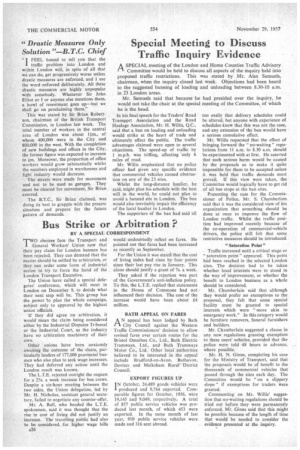Special Meeting to Discuss Traffic Inquiry Evidence
Page 28

If you've noticed an error in this article please click here to report it so we can fix it.
A SPECIAL meeting of the London and Home Counties Traffic Advisory (-2. Committee would be held to discuss all aspects of the inquiry held into proposed traffic restrictions. This was stated by Mr. Alex Samuels, chairman, when the inquiry closed last week. Objections had been heard to the suggested banning of loading and unloading between 8.30-10 a.m. in 23 London areas.
Mr. Samuels said that because he had presided over the inquiry, he would not take the chair at the special meeting of the Committee, of which he is the head.
In his final speech for the Traders' Road Transpprt Association and the Road Haulage Association, Mr. H. Willis, Q.C., said that a ban on loading and unloading would strike at the heart of trade and ultimately affect the public. The traffic advantages claimed were open to several objections. The speed-up of traffic by I m.p.h. was trifling, affecting only 6 miles of road.
Mr. Willis emphasized that no police officer had given any specific evidence that commercial vehicles caused obstruction on any of the 23 sites.
Whilst the long-distance haulier, he said, might plan his schedule with the best will in the world, he could not plan to avoid a banned site in London. The ban would also inevitably impair the efficiency of the local haulier in London.
The supporters of the ban had said all too easily that delivery schedules could be altered, but anyone with experience of schedules knew that this was not the case, and any extension of the ban would have a serious cumulative effect.
Mr. Willis requested that the effect of bringing forward the " no-waiting " regulations from 11 a.m. Co 8.30 a.m. should be experimented with at first. He asserted that such serious harm would be caused by the proposals as to make it quite impossible for them to be accepted unless it was held that traffic demands must prevail. If this view were taken, the Committee would logically have to get rid of all bus stops at the ban sites.
Presenting the case for the Commissioner of Police, Mr. S. Chamberlain said that it was the considered view of his organization that something should be done at once to improve the flow of London traffic. Whilst the traffic position had improved recently because of the co-operation of commercial-vehicle drivers, the police still felt that some restrictive measures should be introduced.
"Saturation Point" Traffic increased until a critical stage or "saturation point" appeared. This point had been reached in the selected London sites. The decision had to be taken whether local interests were to stand in the way of improvement, or whether the benefit to London business as a whole should be considered.
Mr. Chamberlain said that although they would prefer no exemptions to the proposal, they felt that some special facility must be granted to special interests which were "more akin to emergency work." In this category would be furniture removers, funeral furnishers and builders.
Mr. Chamberlain suggested a clause in any new regulations granting exemption to these users' vehicles, provided that the police were told 48 hours in advance, where possible.
Mr. H. N. Ginns, completing his case for the Ministry of Transport, said that the proposals would be of benefit to the thousands of commercial vehicles that passed through the sites each day. The Committee would be "on a slippery slope" if exemptions for traders were granted.
Commenting on Mr. Willis' suggestion that no-waiting regulations should be tried out before they were permanently enforced, Mr. Ginns said that this might be possible because of the length of time that would be needed to consider the evidence presented at the inquiry.




























































































